101956 Intro to International Relations: Economic Globalisation Impact
VerifiedAdded on 2022/12/19
|8
|2152
|1
Essay
AI Summary
This essay examines the complex relationship between economic globalisation and inequality, arguing that globalisation has not decreased inequality worldwide. It begins by defining globalisation and its intended benefits, then discusses the contrasting views on its distributional impacts. The essay uses Marxist theory to explain how globalisation, driven by capitalism, can exacerbate inequality by concentrating wealth in developed nations while less developed countries struggle to fully benefit. It references the Kuznets hypothesis and the views of Eric Maskin, highlighting the challenges faced by low-skilled workers and the persistence of unequal economic structures. The essay concludes that the distributional effects of globalisation lean towards increasing inequality, particularly due to the lack of adequate capital in less developed countries, hindering their ability to fully leverage the opportunities presented by globalisation. Desklib provides access to similar essays and study resources for students.
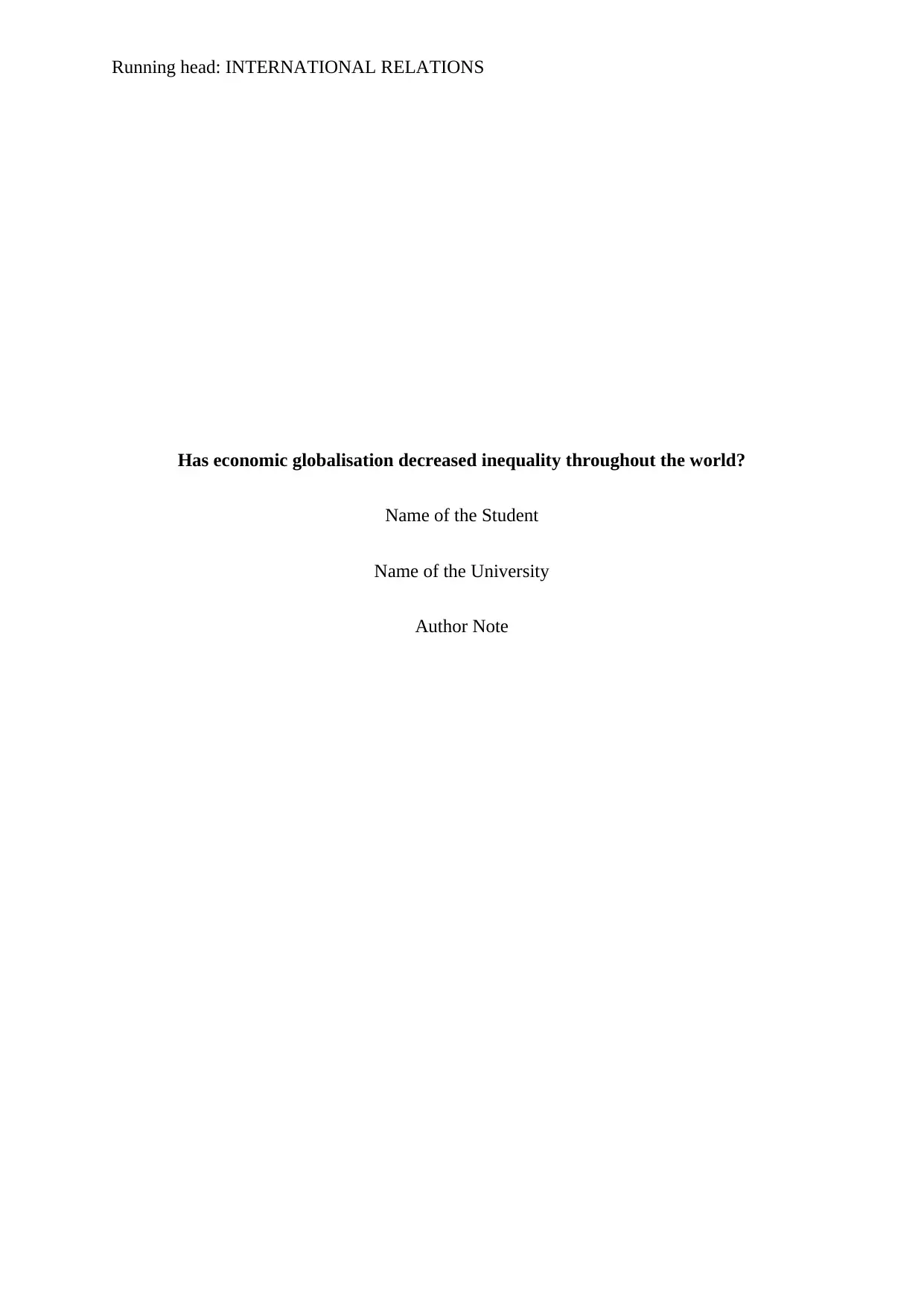
Running head: INTERNATIONAL RELATIONS
Has economic globalisation decreased inequality throughout the world?
Name of the Student
Name of the University
Author Note
Has economic globalisation decreased inequality throughout the world?
Name of the Student
Name of the University
Author Note
Paraphrase This Document
Need a fresh take? Get an instant paraphrase of this document with our AI Paraphraser

1INTERNATIONAL RELATIONS
Introduction
The subject of economic globalization and inequality is a debated one. Globalization
refers to the process of integration and interaction among the nations, people, governments
and all types of political and economic activities, such as, businesses, international trade,
cross border investment supported by advanced information technology and labor migration
between nations (Steger, 2017). The process of globalization has impacts on the economic
development, environment, culture, political systems and on well being of people across the
societies of the world. Thus, economic development and prosperity is one of the major
outcomes of the globalization. According to World Economic Outlook by IMF (2007),
globalization has led to the integration of the world economy through the cross border
interactions of trade and finance to an unprecedented level. In the modern world, dominated
by advanced technology, the wave of globalization has a far-reaching impact on the economic
wellbeing of the people across all the regions and among all the income groups. Although
globalization has created millions of opportunities for employment spanning all over the
world, as per many experts, globalization has resulted in economic inequality among the
nations. It has been observed that the gap between the poorest and the richest countries is
widening and thus, economic inequality among many countries is increasing in reality instead
of decreasing (Milanovic, 2016). This essay will present a discussion on the impact of
economic globalization on the inequality among the countries and the relationship between
globalization and inequality will be explained in the light of Marxism, an international
relations theory.
Discussion
The wave of globalization started with technological revolution and based on this, the
governmental policies developed to open up the economies locally as well as globally. Post
Introduction
The subject of economic globalization and inequality is a debated one. Globalization
refers to the process of integration and interaction among the nations, people, governments
and all types of political and economic activities, such as, businesses, international trade,
cross border investment supported by advanced information technology and labor migration
between nations (Steger, 2017). The process of globalization has impacts on the economic
development, environment, culture, political systems and on well being of people across the
societies of the world. Thus, economic development and prosperity is one of the major
outcomes of the globalization. According to World Economic Outlook by IMF (2007),
globalization has led to the integration of the world economy through the cross border
interactions of trade and finance to an unprecedented level. In the modern world, dominated
by advanced technology, the wave of globalization has a far-reaching impact on the economic
wellbeing of the people across all the regions and among all the income groups. Although
globalization has created millions of opportunities for employment spanning all over the
world, as per many experts, globalization has resulted in economic inequality among the
nations. It has been observed that the gap between the poorest and the richest countries is
widening and thus, economic inequality among many countries is increasing in reality instead
of decreasing (Milanovic, 2016). This essay will present a discussion on the impact of
economic globalization on the inequality among the countries and the relationship between
globalization and inequality will be explained in the light of Marxism, an international
relations theory.
Discussion
The wave of globalization started with technological revolution and based on this, the
governmental policies developed to open up the economies locally as well as globally. Post
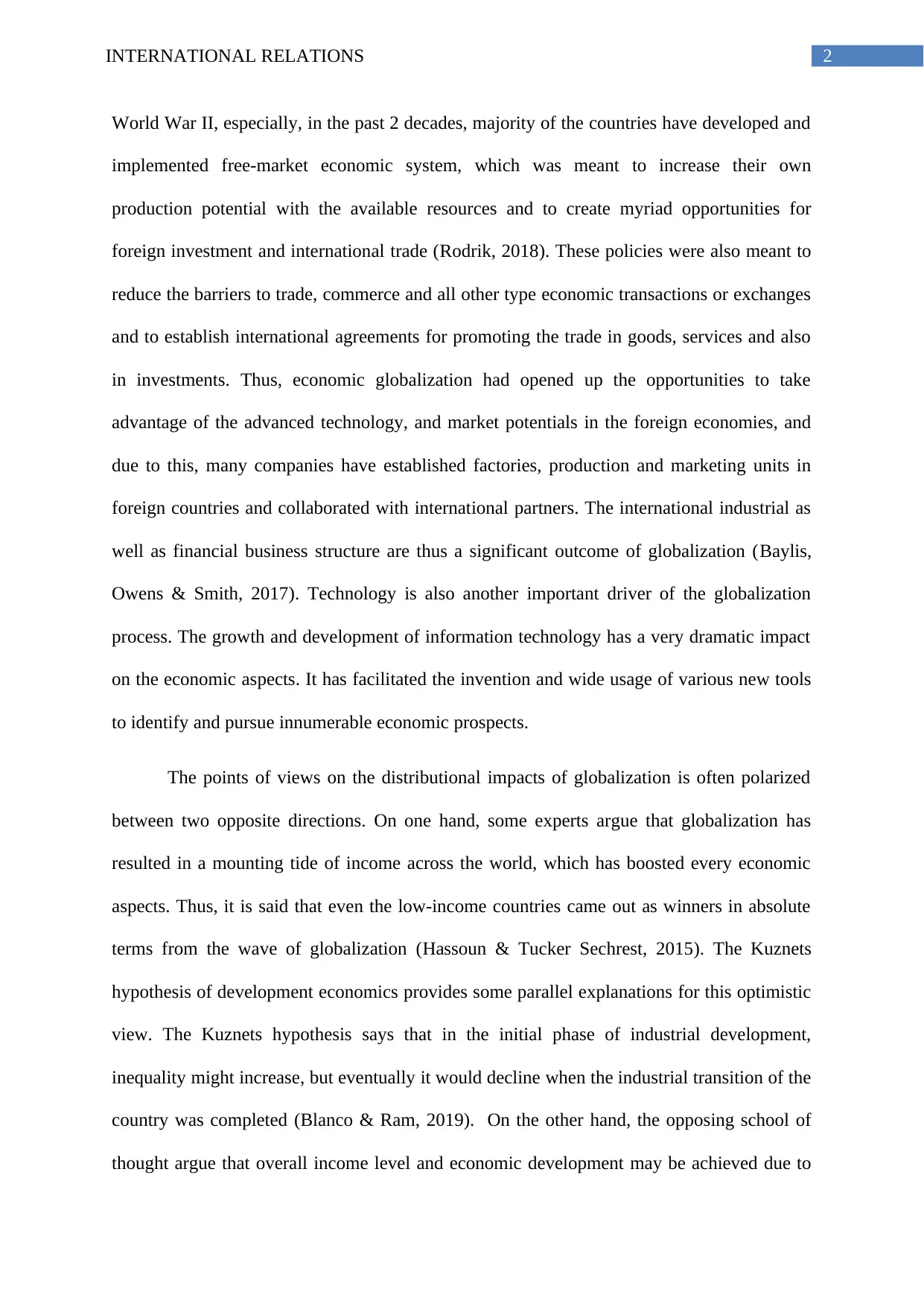
2INTERNATIONAL RELATIONS
World War II, especially, in the past 2 decades, majority of the countries have developed and
implemented free-market economic system, which was meant to increase their own
production potential with the available resources and to create myriad opportunities for
foreign investment and international trade (Rodrik, 2018). These policies were also meant to
reduce the barriers to trade, commerce and all other type economic transactions or exchanges
and to establish international agreements for promoting the trade in goods, services and also
in investments. Thus, economic globalization had opened up the opportunities to take
advantage of the advanced technology, and market potentials in the foreign economies, and
due to this, many companies have established factories, production and marketing units in
foreign countries and collaborated with international partners. The international industrial as
well as financial business structure are thus a significant outcome of globalization (Baylis,
Owens & Smith, 2017). Technology is also another important driver of the globalization
process. The growth and development of information technology has a very dramatic impact
on the economic aspects. It has facilitated the invention and wide usage of various new tools
to identify and pursue innumerable economic prospects.
The points of views on the distributional impacts of globalization is often polarized
between two opposite directions. On one hand, some experts argue that globalization has
resulted in a mounting tide of income across the world, which has boosted every economic
aspects. Thus, it is said that even the low-income countries came out as winners in absolute
terms from the wave of globalization (Hassoun & Tucker Sechrest, 2015). The Kuznets
hypothesis of development economics provides some parallel explanations for this optimistic
view. The Kuznets hypothesis says that in the initial phase of industrial development,
inequality might increase, but eventually it would decline when the industrial transition of the
country was completed (Blanco & Ram, 2019). On the other hand, the opposing school of
thought argue that overall income level and economic development may be achieved due to
World War II, especially, in the past 2 decades, majority of the countries have developed and
implemented free-market economic system, which was meant to increase their own
production potential with the available resources and to create myriad opportunities for
foreign investment and international trade (Rodrik, 2018). These policies were also meant to
reduce the barriers to trade, commerce and all other type economic transactions or exchanges
and to establish international agreements for promoting the trade in goods, services and also
in investments. Thus, economic globalization had opened up the opportunities to take
advantage of the advanced technology, and market potentials in the foreign economies, and
due to this, many companies have established factories, production and marketing units in
foreign countries and collaborated with international partners. The international industrial as
well as financial business structure are thus a significant outcome of globalization (Baylis,
Owens & Smith, 2017). Technology is also another important driver of the globalization
process. The growth and development of information technology has a very dramatic impact
on the economic aspects. It has facilitated the invention and wide usage of various new tools
to identify and pursue innumerable economic prospects.
The points of views on the distributional impacts of globalization is often polarized
between two opposite directions. On one hand, some experts argue that globalization has
resulted in a mounting tide of income across the world, which has boosted every economic
aspects. Thus, it is said that even the low-income countries came out as winners in absolute
terms from the wave of globalization (Hassoun & Tucker Sechrest, 2015). The Kuznets
hypothesis of development economics provides some parallel explanations for this optimistic
view. The Kuznets hypothesis says that in the initial phase of industrial development,
inequality might increase, but eventually it would decline when the industrial transition of the
country was completed (Blanco & Ram, 2019). On the other hand, the opposing school of
thought argue that overall income level and economic development may be achieved due to
⊘ This is a preview!⊘
Do you want full access?
Subscribe today to unlock all pages.

Trusted by 1+ million students worldwide
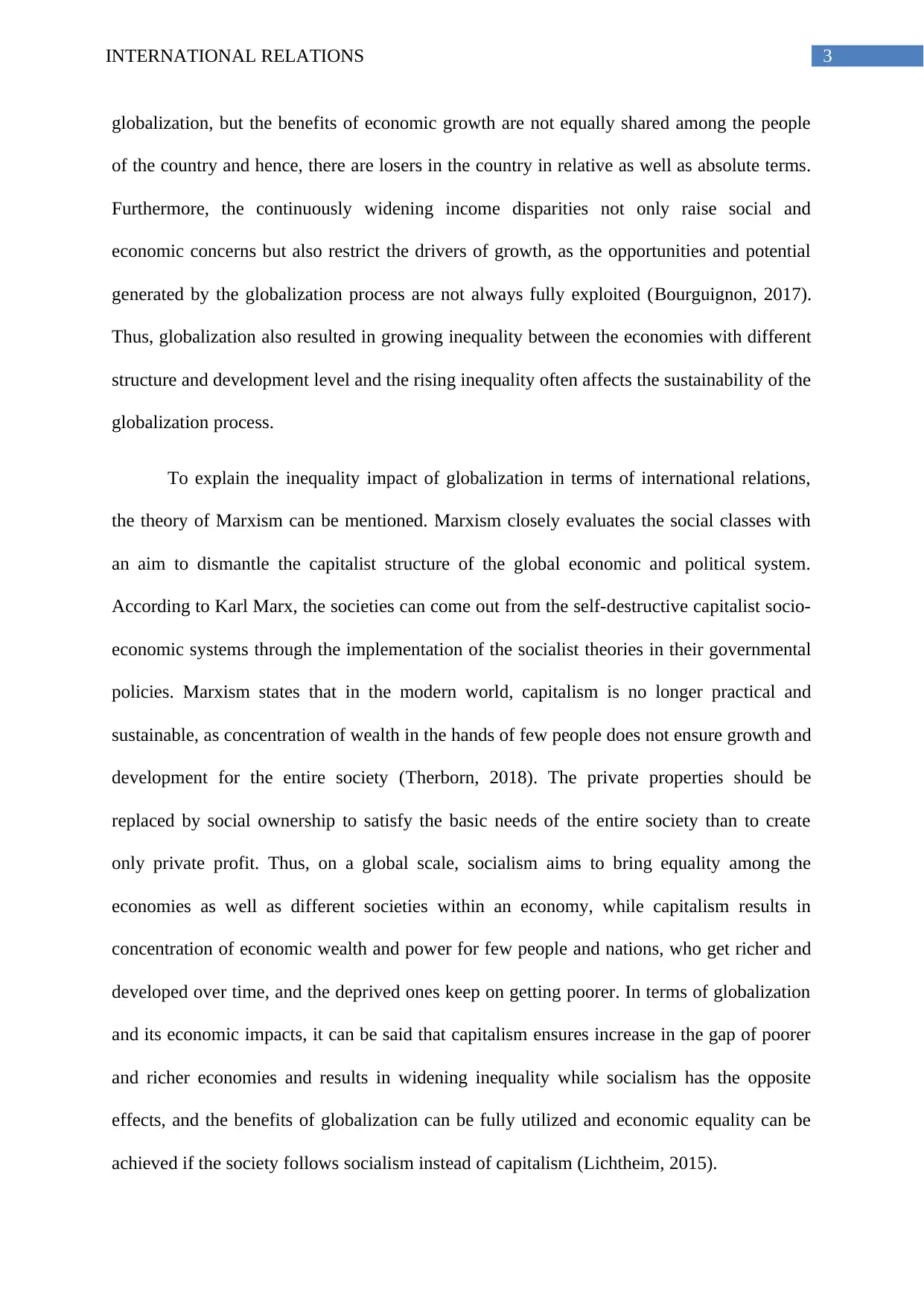
3INTERNATIONAL RELATIONS
globalization, but the benefits of economic growth are not equally shared among the people
of the country and hence, there are losers in the country in relative as well as absolute terms.
Furthermore, the continuously widening income disparities not only raise social and
economic concerns but also restrict the drivers of growth, as the opportunities and potential
generated by the globalization process are not always fully exploited (Bourguignon, 2017).
Thus, globalization also resulted in growing inequality between the economies with different
structure and development level and the rising inequality often affects the sustainability of the
globalization process.
To explain the inequality impact of globalization in terms of international relations,
the theory of Marxism can be mentioned. Marxism closely evaluates the social classes with
an aim to dismantle the capitalist structure of the global economic and political system.
According to Karl Marx, the societies can come out from the self-destructive capitalist socio-
economic systems through the implementation of the socialist theories in their governmental
policies. Marxism states that in the modern world, capitalism is no longer practical and
sustainable, as concentration of wealth in the hands of few people does not ensure growth and
development for the entire society (Therborn, 2018). The private properties should be
replaced by social ownership to satisfy the basic needs of the entire society than to create
only private profit. Thus, on a global scale, socialism aims to bring equality among the
economies as well as different societies within an economy, while capitalism results in
concentration of economic wealth and power for few people and nations, who get richer and
developed over time, and the deprived ones keep on getting poorer. In terms of globalization
and its economic impacts, it can be said that capitalism ensures increase in the gap of poorer
and richer economies and results in widening inequality while socialism has the opposite
effects, and the benefits of globalization can be fully utilized and economic equality can be
achieved if the society follows socialism instead of capitalism (Lichtheim, 2015).
globalization, but the benefits of economic growth are not equally shared among the people
of the country and hence, there are losers in the country in relative as well as absolute terms.
Furthermore, the continuously widening income disparities not only raise social and
economic concerns but also restrict the drivers of growth, as the opportunities and potential
generated by the globalization process are not always fully exploited (Bourguignon, 2017).
Thus, globalization also resulted in growing inequality between the economies with different
structure and development level and the rising inequality often affects the sustainability of the
globalization process.
To explain the inequality impact of globalization in terms of international relations,
the theory of Marxism can be mentioned. Marxism closely evaluates the social classes with
an aim to dismantle the capitalist structure of the global economic and political system.
According to Karl Marx, the societies can come out from the self-destructive capitalist socio-
economic systems through the implementation of the socialist theories in their governmental
policies. Marxism states that in the modern world, capitalism is no longer practical and
sustainable, as concentration of wealth in the hands of few people does not ensure growth and
development for the entire society (Therborn, 2018). The private properties should be
replaced by social ownership to satisfy the basic needs of the entire society than to create
only private profit. Thus, on a global scale, socialism aims to bring equality among the
economies as well as different societies within an economy, while capitalism results in
concentration of economic wealth and power for few people and nations, who get richer and
developed over time, and the deprived ones keep on getting poorer. In terms of globalization
and its economic impacts, it can be said that capitalism ensures increase in the gap of poorer
and richer economies and results in widening inequality while socialism has the opposite
effects, and the benefits of globalization can be fully utilized and economic equality can be
achieved if the society follows socialism instead of capitalism (Lichtheim, 2015).
Paraphrase This Document
Need a fresh take? Get an instant paraphrase of this document with our AI Paraphraser
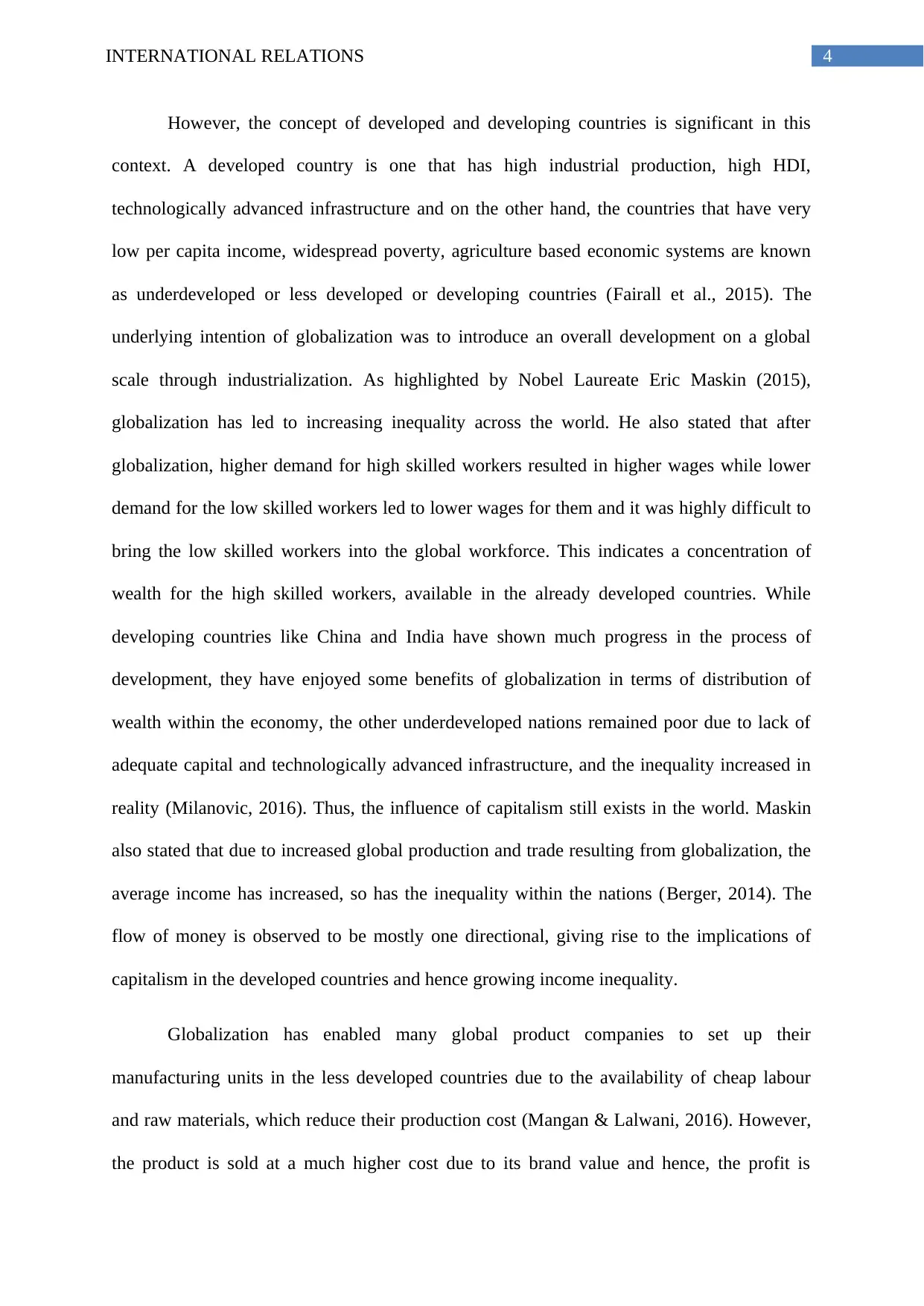
4INTERNATIONAL RELATIONS
However, the concept of developed and developing countries is significant in this
context. A developed country is one that has high industrial production, high HDI,
technologically advanced infrastructure and on the other hand, the countries that have very
low per capita income, widespread poverty, agriculture based economic systems are known
as underdeveloped or less developed or developing countries (Fairall et al., 2015). The
underlying intention of globalization was to introduce an overall development on a global
scale through industrialization. As highlighted by Nobel Laureate Eric Maskin (2015),
globalization has led to increasing inequality across the world. He also stated that after
globalization, higher demand for high skilled workers resulted in higher wages while lower
demand for the low skilled workers led to lower wages for them and it was highly difficult to
bring the low skilled workers into the global workforce. This indicates a concentration of
wealth for the high skilled workers, available in the already developed countries. While
developing countries like China and India have shown much progress in the process of
development, they have enjoyed some benefits of globalization in terms of distribution of
wealth within the economy, the other underdeveloped nations remained poor due to lack of
adequate capital and technologically advanced infrastructure, and the inequality increased in
reality (Milanovic, 2016). Thus, the influence of capitalism still exists in the world. Maskin
also stated that due to increased global production and trade resulting from globalization, the
average income has increased, so has the inequality within the nations (Berger, 2014). The
flow of money is observed to be mostly one directional, giving rise to the implications of
capitalism in the developed countries and hence growing income inequality.
Globalization has enabled many global product companies to set up their
manufacturing units in the less developed countries due to the availability of cheap labour
and raw materials, which reduce their production cost (Mangan & Lalwani, 2016). However,
the product is sold at a much higher cost due to its brand value and hence, the profit is
However, the concept of developed and developing countries is significant in this
context. A developed country is one that has high industrial production, high HDI,
technologically advanced infrastructure and on the other hand, the countries that have very
low per capita income, widespread poverty, agriculture based economic systems are known
as underdeveloped or less developed or developing countries (Fairall et al., 2015). The
underlying intention of globalization was to introduce an overall development on a global
scale through industrialization. As highlighted by Nobel Laureate Eric Maskin (2015),
globalization has led to increasing inequality across the world. He also stated that after
globalization, higher demand for high skilled workers resulted in higher wages while lower
demand for the low skilled workers led to lower wages for them and it was highly difficult to
bring the low skilled workers into the global workforce. This indicates a concentration of
wealth for the high skilled workers, available in the already developed countries. While
developing countries like China and India have shown much progress in the process of
development, they have enjoyed some benefits of globalization in terms of distribution of
wealth within the economy, the other underdeveloped nations remained poor due to lack of
adequate capital and technologically advanced infrastructure, and the inequality increased in
reality (Milanovic, 2016). Thus, the influence of capitalism still exists in the world. Maskin
also stated that due to increased global production and trade resulting from globalization, the
average income has increased, so has the inequality within the nations (Berger, 2014). The
flow of money is observed to be mostly one directional, giving rise to the implications of
capitalism in the developed countries and hence growing income inequality.
Globalization has enabled many global product companies to set up their
manufacturing units in the less developed countries due to the availability of cheap labour
and raw materials, which reduce their production cost (Mangan & Lalwani, 2016). However,
the product is sold at a much higher cost due to its brand value and hence, the profit is
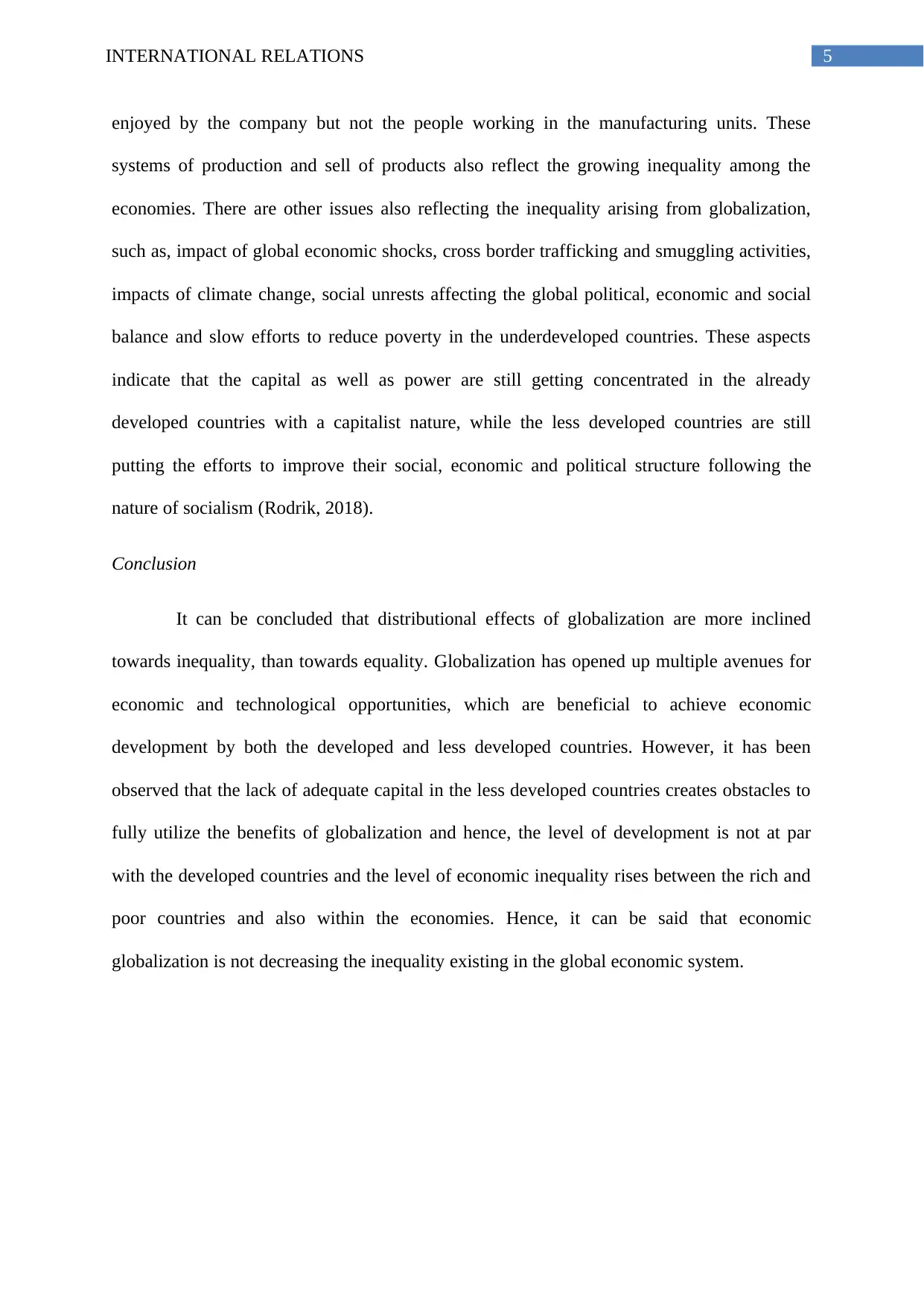
5INTERNATIONAL RELATIONS
enjoyed by the company but not the people working in the manufacturing units. These
systems of production and sell of products also reflect the growing inequality among the
economies. There are other issues also reflecting the inequality arising from globalization,
such as, impact of global economic shocks, cross border trafficking and smuggling activities,
impacts of climate change, social unrests affecting the global political, economic and social
balance and slow efforts to reduce poverty in the underdeveloped countries. These aspects
indicate that the capital as well as power are still getting concentrated in the already
developed countries with a capitalist nature, while the less developed countries are still
putting the efforts to improve their social, economic and political structure following the
nature of socialism (Rodrik, 2018).
Conclusion
It can be concluded that distributional effects of globalization are more inclined
towards inequality, than towards equality. Globalization has opened up multiple avenues for
economic and technological opportunities, which are beneficial to achieve economic
development by both the developed and less developed countries. However, it has been
observed that the lack of adequate capital in the less developed countries creates obstacles to
fully utilize the benefits of globalization and hence, the level of development is not at par
with the developed countries and the level of economic inequality rises between the rich and
poor countries and also within the economies. Hence, it can be said that economic
globalization is not decreasing the inequality existing in the global economic system.
enjoyed by the company but not the people working in the manufacturing units. These
systems of production and sell of products also reflect the growing inequality among the
economies. There are other issues also reflecting the inequality arising from globalization,
such as, impact of global economic shocks, cross border trafficking and smuggling activities,
impacts of climate change, social unrests affecting the global political, economic and social
balance and slow efforts to reduce poverty in the underdeveloped countries. These aspects
indicate that the capital as well as power are still getting concentrated in the already
developed countries with a capitalist nature, while the less developed countries are still
putting the efforts to improve their social, economic and political structure following the
nature of socialism (Rodrik, 2018).
Conclusion
It can be concluded that distributional effects of globalization are more inclined
towards inequality, than towards equality. Globalization has opened up multiple avenues for
economic and technological opportunities, which are beneficial to achieve economic
development by both the developed and less developed countries. However, it has been
observed that the lack of adequate capital in the less developed countries creates obstacles to
fully utilize the benefits of globalization and hence, the level of development is not at par
with the developed countries and the level of economic inequality rises between the rich and
poor countries and also within the economies. Hence, it can be said that economic
globalization is not decreasing the inequality existing in the global economic system.
⊘ This is a preview!⊘
Do you want full access?
Subscribe today to unlock all pages.

Trusted by 1+ million students worldwide
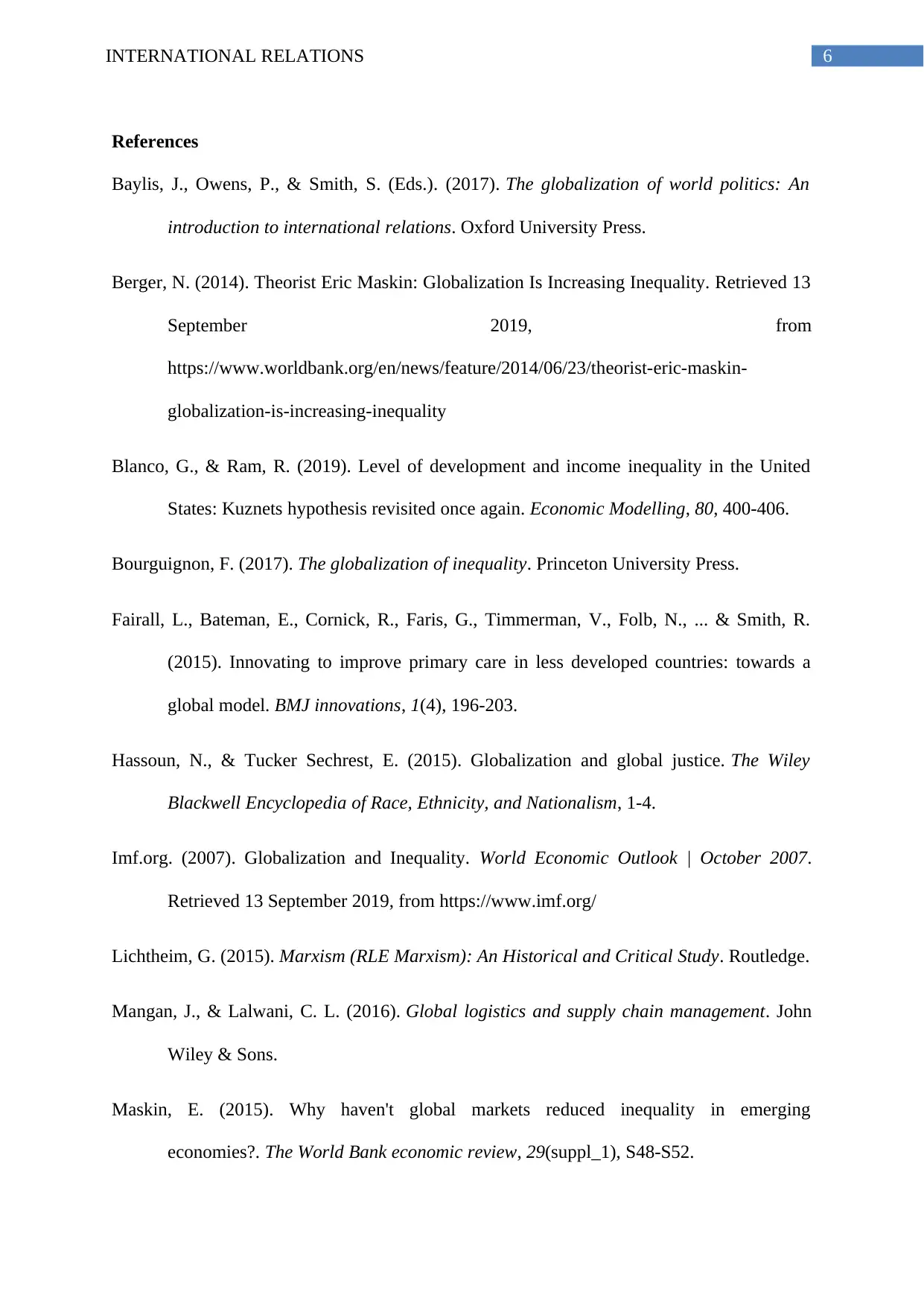
6INTERNATIONAL RELATIONS
References
Baylis, J., Owens, P., & Smith, S. (Eds.). (2017). The globalization of world politics: An
introduction to international relations. Oxford University Press.
Berger, N. (2014). Theorist Eric Maskin: Globalization Is Increasing Inequality. Retrieved 13
September 2019, from
https://www.worldbank.org/en/news/feature/2014/06/23/theorist-eric-maskin-
globalization-is-increasing-inequality
Blanco, G., & Ram, R. (2019). Level of development and income inequality in the United
States: Kuznets hypothesis revisited once again. Economic Modelling, 80, 400-406.
Bourguignon, F. (2017). The globalization of inequality. Princeton University Press.
Fairall, L., Bateman, E., Cornick, R., Faris, G., Timmerman, V., Folb, N., ... & Smith, R.
(2015). Innovating to improve primary care in less developed countries: towards a
global model. BMJ innovations, 1(4), 196-203.
Hassoun, N., & Tucker Sechrest, E. (2015). Globalization and global justice. The Wiley
Blackwell Encyclopedia of Race, Ethnicity, and Nationalism, 1-4.
Imf.org. (2007). Globalization and Inequality. World Economic Outlook | October 2007.
Retrieved 13 September 2019, from https://www.imf.org/
Lichtheim, G. (2015). Marxism (RLE Marxism): An Historical and Critical Study. Routledge.
Mangan, J., & Lalwani, C. L. (2016). Global logistics and supply chain management. John
Wiley & Sons.
Maskin, E. (2015). Why haven't global markets reduced inequality in emerging
economies?. The World Bank economic review, 29(suppl_1), S48-S52.
References
Baylis, J., Owens, P., & Smith, S. (Eds.). (2017). The globalization of world politics: An
introduction to international relations. Oxford University Press.
Berger, N. (2014). Theorist Eric Maskin: Globalization Is Increasing Inequality. Retrieved 13
September 2019, from
https://www.worldbank.org/en/news/feature/2014/06/23/theorist-eric-maskin-
globalization-is-increasing-inequality
Blanco, G., & Ram, R. (2019). Level of development and income inequality in the United
States: Kuznets hypothesis revisited once again. Economic Modelling, 80, 400-406.
Bourguignon, F. (2017). The globalization of inequality. Princeton University Press.
Fairall, L., Bateman, E., Cornick, R., Faris, G., Timmerman, V., Folb, N., ... & Smith, R.
(2015). Innovating to improve primary care in less developed countries: towards a
global model. BMJ innovations, 1(4), 196-203.
Hassoun, N., & Tucker Sechrest, E. (2015). Globalization and global justice. The Wiley
Blackwell Encyclopedia of Race, Ethnicity, and Nationalism, 1-4.
Imf.org. (2007). Globalization and Inequality. World Economic Outlook | October 2007.
Retrieved 13 September 2019, from https://www.imf.org/
Lichtheim, G. (2015). Marxism (RLE Marxism): An Historical and Critical Study. Routledge.
Mangan, J., & Lalwani, C. L. (2016). Global logistics and supply chain management. John
Wiley & Sons.
Maskin, E. (2015). Why haven't global markets reduced inequality in emerging
economies?. The World Bank economic review, 29(suppl_1), S48-S52.
Paraphrase This Document
Need a fresh take? Get an instant paraphrase of this document with our AI Paraphraser
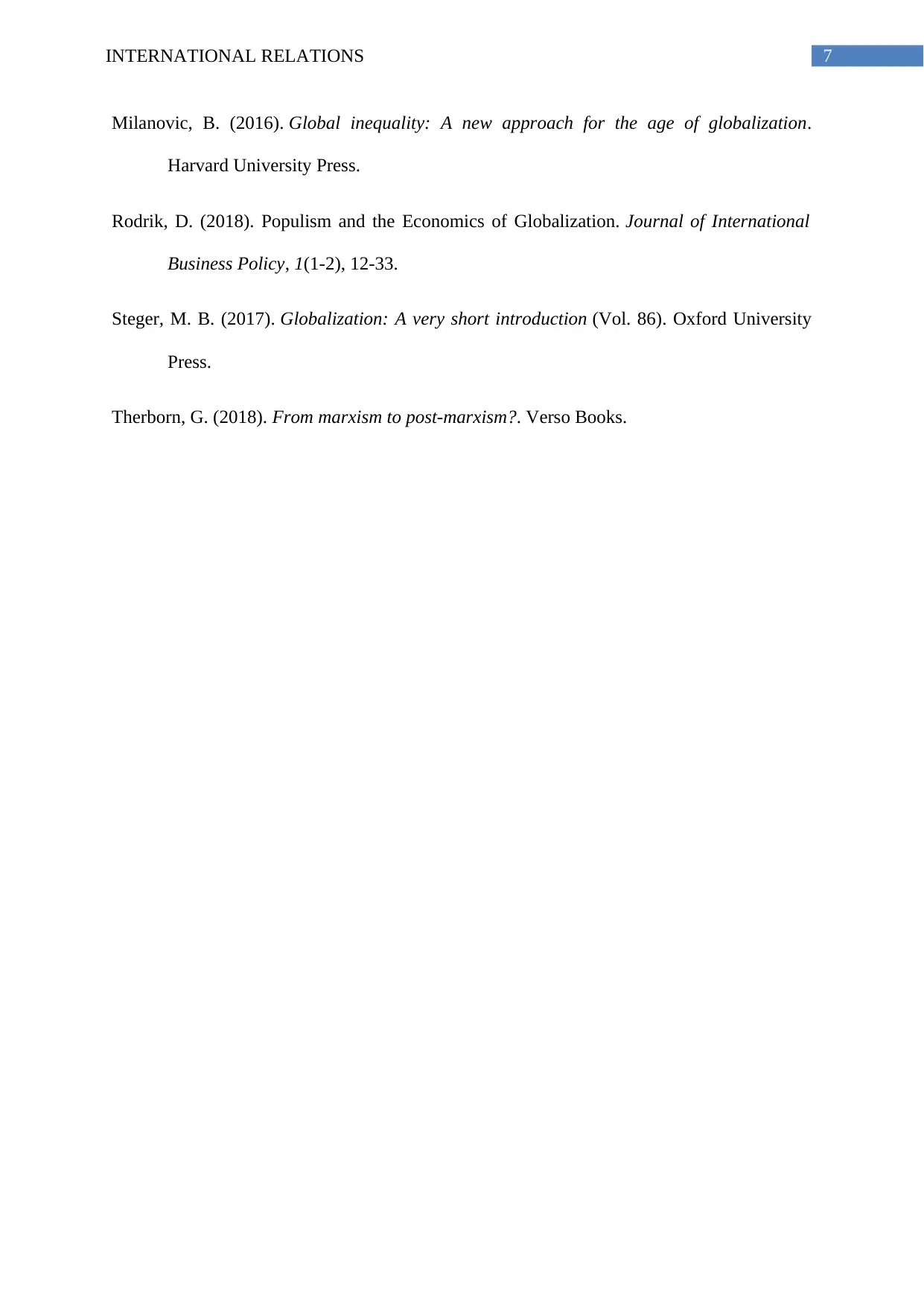
7INTERNATIONAL RELATIONS
Milanovic, B. (2016). Global inequality: A new approach for the age of globalization.
Harvard University Press.
Rodrik, D. (2018). Populism and the Economics of Globalization. Journal of International
Business Policy, 1(1-2), 12-33.
Steger, M. B. (2017). Globalization: A very short introduction (Vol. 86). Oxford University
Press.
Therborn, G. (2018). From marxism to post-marxism?. Verso Books.
Milanovic, B. (2016). Global inequality: A new approach for the age of globalization.
Harvard University Press.
Rodrik, D. (2018). Populism and the Economics of Globalization. Journal of International
Business Policy, 1(1-2), 12-33.
Steger, M. B. (2017). Globalization: A very short introduction (Vol. 86). Oxford University
Press.
Therborn, G. (2018). From marxism to post-marxism?. Verso Books.
1 out of 8
Related Documents
Your All-in-One AI-Powered Toolkit for Academic Success.
+13062052269
info@desklib.com
Available 24*7 on WhatsApp / Email
![[object Object]](/_next/static/media/star-bottom.7253800d.svg)
Unlock your academic potential
Copyright © 2020–2026 A2Z Services. All Rights Reserved. Developed and managed by ZUCOL.





